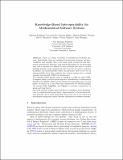Files in this item
Knowledge-based interoperability for mathematical software systems
Item metadata
| dc.contributor.author | Kohlhase, Michael | |
| dc.contributor.author | De Feo, Luca | |
| dc.contributor.author | Müller, Dennis | |
| dc.contributor.author | Pfeiffer, Markus Johannes | |
| dc.contributor.author | Rabe, Florian | |
| dc.contributor.author | Thiéry, Nicolas | |
| dc.contributor.author | Vasilyev, Victor | |
| dc.contributor.author | Wiesing, Tom | |
| dc.contributor.editor | Blömer, Johannes | |
| dc.contributor.editor | Kotsireas, Ilias | |
| dc.contributor.editor | Kutsia, Temur | |
| dc.contributor.editor | Simos, Dimitris E. | |
| dc.date.accessioned | 2018-01-16T15:30:14Z | |
| dc.date.available | 2018-01-16T15:30:14Z | |
| dc.date.issued | 2017 | |
| dc.identifier | 251333725 | |
| dc.identifier | 8941b405-213b-4c95-89dd-93e20d5f86ec | |
| dc.identifier | 85039430221 | |
| dc.identifier.citation | Kohlhase , M , De Feo , L , Müller , D , Pfeiffer , M J , Rabe , F , Thiéry , N , Vasilyev , V & Wiesing , T 2017 , Knowledge-based interoperability for mathematical software systems . in J Blömer , I Kotsireas , T Kutsia & D E Simos (eds) , Mathematical Aspects of Computer and Information Sciences : 7th International Conference, MACIS 2017, Vienna, Austria, November 15-17, 2017, Proceedings . Lecture Notes in Computer Science (Theoretical Computer Science and General Issues) , vol. 10693 , Springer , Cham , pp. 195-210 , 7th International Conference on Mathematical Aspects of Computer and Information Sciences , Vienna , Austria , 15/11/17 . https://doi.org/10.1007/978-3-319-72453-9_14 | en |
| dc.identifier.citation | conference | en |
| dc.identifier.isbn | 9783319724522 | |
| dc.identifier.isbn | 9783319724539 | |
| dc.identifier.issn | 0302-9743 | |
| dc.identifier.other | ORCID: /0000-0002-9881-4429/work/47136373 | |
| dc.identifier.uri | https://hdl.handle.net/10023/12491 | |
| dc.description | Funding: OpenDreamKit Horizon 2020 European Research Infrastructures project (#676541) and DFG project RA-18723-1 OAF. | en |
| dc.description.abstract | There is a large ecosystem of mathematical software systems. Individually, these are optimized for particular domains and functionalities, and together they cover many needs of practical and theoretical mathematics. However, each system specializes on one area, and it remains very difficult to solve problems that need to involve multiple systems. Some integrations exist, but the are ad-hoc and have scalability and maintainability issues. In particular, there is not yet an interoperability layer that combines the various systems into a virtual research environment (VRE) for mathematics. The OpenDreamKit project aims at building a toolkit for such VREs. It suggests using a central system-agnostic formalization of mathematics (Math-in-the-Middle, MitM) as the needed interoperability layer. In this paper, we conduct the first major case study that instantiates the MitM paradigm for a concrete domain as well as a concrete set of systems. Specifically, we integrate GAP, Sage, and Singular to perform computation in group and ring theory. Our work involves massive practical efforts, including a novel formalization of computational group theory, improvements to the involved software systems, and a novel mediating system that sits at the center of a star-shaped integration layout between mathematical software systems. | |
| dc.format.extent | 319383 | |
| dc.language.iso | eng | |
| dc.publisher | Springer | |
| dc.relation.ispartof | Mathematical Aspects of Computer and Information Sciences | en |
| dc.relation.ispartofseries | Lecture Notes in Computer Science (Theoretical Computer Science and General Issues) | en |
| dc.rights | © 2017, Springer International Publishing AG. This work has been made available online in accordance with the publisher’s policies. This is the author created, accepted version manuscript following peer review and may differ slightly from the final published version. The final published version of this work is available at https://doi.org/10.1007/978-3-319-72453-9_14 | en |
| dc.subject | QA76 Computer software | en |
| dc.subject | T-NDAS | en |
| dc.subject.lcc | QA76 | en |
| dc.title | Knowledge-based interoperability for mathematical software systems | en |
| dc.type | Conference item | en |
| dc.contributor.sponsor | European Commission | en |
| dc.contributor.institution | University of St Andrews.School of Computer Science | en |
| dc.contributor.institution | University of St Andrews.Centre for Interdisciplinary Research in Computational Algebra | en |
| dc.identifier.doi | 10.1007/978-3-319-72453-9_14 | |
| dc.identifier.grantnumber | 676541 | en |
This item appears in the following Collection(s)
Items in the St Andrews Research Repository are protected by copyright, with all rights reserved, unless otherwise indicated.

